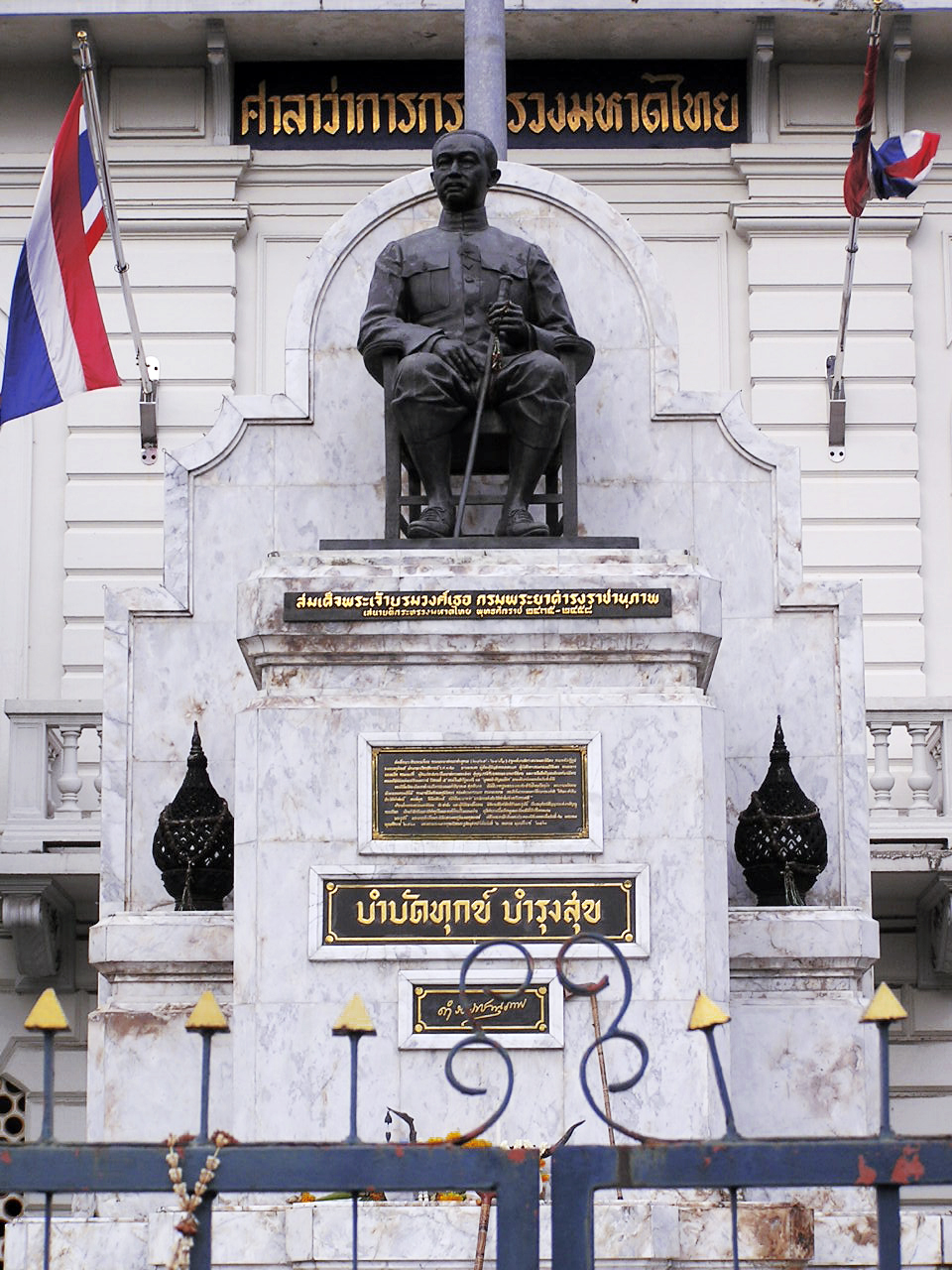|
Thai National ID Card
The Thai identity card ( th, บัตรประจำตัวประชาชนไทย; ; ) is an official identity document issued to Thai nationals between the age of 7 and 70 years.ราชกิจจานุเบกษาพระราชบัญญัติบัตรประจำตัวประชาชน (ฉบับที่ ๓) พ.ศ. ๒๕๕๔ เล่ม ๑๒๘ ตอนที่ ๓๔ ก, ๑๑ พฤษภาคม ๒๕๕๔ (National Identification Card amendment act, 2011) It was first introduced in 1943 when Plaek Phibunsongkram was the Prime Minister. The minimum age was originally 16 years but later altered to 15 in 1983 and 7 in 2011. The card is used for proving the holder's identity and receiving government services. Other private services, such as applying for a mobile phone contract or opening a bank account, also require a production of valid identity card. Failure to produce a card without good reasons can result i ... [...More Info...] [...Related Items...] OR: [Wikipedia] [Google] [Baidu] |
Ministry Of Interior (Thailand)
The Ministry of Interior of the Kingdom of Thailand ( Abrv: MOI; th, กระทรวงมหาดไทย, ) is a cabinet-level department in the Government of Thailand. The ministry has wide ranging responsibilities. It is responsible for local administration, internal security, citizenship, disaster management, road safety, land management, issuance of national identity cards, and public works. The ministry is responsible for appointing the 76 governors of the Provinces of Thailand. The Minister of Interior ( th, รัฐมนตรีกระทรวงมหาดไทย) is the head of the ministry. He is appointed by the King of Thailand on the recommendation of the prime minister. Since 30 August 2014, the head of the ministry has been retired General Anupong Paochinda. He is aided by two deputy ministers. The FY2019 budget of the ministry is 371,802 million baht. History The ministry in its present form was founded on 1 April 1892 by King Chulalongkorn (Rama V ... [...More Info...] [...Related Items...] OR: [Wikipedia] [Google] [Baidu] |
Census
A census is the procedure of systematically acquiring, recording and calculating information about the members of a given population. This term is used mostly in connection with national population and housing censuses; other common censuses include censuses of agriculture, traditional culture, business, supplies, and traffic censuses. The United Nations (UN) defines the essential features of population and housing censuses as "individual enumeration, universality within a defined territory, simultaneity and defined periodicity", and recommends that population censuses be taken at least every ten years. UN recommendations also cover census topics to be collected, official definitions, classifications and other useful information to co-ordinate international practices. The UN's Food and Agriculture Organization (FAO), in turn, defines the census of agriculture as "a statistical operation for collecting, processing and disseminating data on the structure of agriculture, covering th ... [...More Info...] [...Related Items...] OR: [Wikipedia] [Google] [Baidu] |
English Language
English is a West Germanic language of the Indo-European language family, with its earliest forms spoken by the inhabitants of early medieval England. It is named after the Angles, one of the ancient Germanic peoples that migrated to the island of Great Britain. Existing on a dialect continuum with Scots, and then closest related to the Low Saxon and Frisian languages, English is genealogically West Germanic. However, its vocabulary is also distinctively influenced by dialects of France (about 29% of Modern English words) and Latin (also about 29%), plus some grammar and a small amount of core vocabulary influenced by Old Norse (a North Germanic language). Speakers of English are called Anglophones. The earliest forms of English, collectively known as Old English, evolved from a group of West Germanic (Ingvaeonic) dialects brought to Great Britain by Anglo-Saxon settlers in the 5th century and further mutated by Norse-speaking Viking settlers starting in the 8th and 9th ... [...More Info...] [...Related Items...] OR: [Wikipedia] [Google] [Baidu] |
Date Of Birth
A birthday is the anniversary of the birth of a person, or figuratively of an institution. Birthdays of people are celebrated in numerous cultures, often with birthday gifts, birthday cards, a birthday party, or a rite of passage. Many religions celebrate the birth of their founders or religious figures with special holidays (e.g. Christmas, Mawlid, Buddha's Birthday, and Krishna Janmashtami). There is a distinction between birth''day'' and birth''date'': the former, except for February 29, occurs each year (e.g. January 15), while the latter is the complete date when a person was born (e.g. January 15, 2001). Legal conventions In most legal systems, one becomes a legal adult on a particular birthday when they reach the age of majority (usually between 12 and 21), and reaching age-specific milestones confers particular rights and responsibilities. At certain ages, one may become eligible to leave full-time education, become subject to military conscription or to enlist ... [...More Info...] [...Related Items...] OR: [Wikipedia] [Google] [Baidu] |
Document
A document is a written, drawn, presented, or memorialized representation of thought, often the manifestation of non-fictional, as well as fictional, content. The word originates from the Latin ''Documentum'', which denotes a "teaching" or "lesson": the verb ''doceō'' denotes "to teach". In the past, the word was usually used to denote written proof useful as evidence of a truth or fact. In the computer age, "document" usually denotes a primarily textual computer file, including its structure and format, e.g. fonts, colors, and images. Contemporarily, "document" is not defined by its transmission medium, e.g., paper, given the existence of electronic documents. "Documentation" is distinct because it has more denotations than "document". Documents are also distinguished from " realia", which are three-dimensional objects that would otherwise satisfy the definition of "document" because they memorialize or represent thought; documents are considered more as 2-dimensional rep ... [...More Info...] [...Related Items...] OR: [Wikipedia] [Google] [Baidu] |
Checksum
A checksum is a small-sized block of data derived from another block of digital data for the purpose of detecting errors that may have been introduced during its transmission or storage. By themselves, checksums are often used to verify data integrity but are not relied upon to verify data authenticity. The procedure which generates this checksum is called a checksum function or checksum algorithm. Depending on its design goals, a good checksum algorithm usually outputs a significantly different value, even for small changes made to the input. This is especially true of cryptographic hash functions, which may be used to detect many data corruption errors and verify overall data integrity; if the computed checksum for the current data input matches the stored value of a previously computed checksum, there is a very high probability the data has not been accidentally altered or corrupted. Checksum functions are related to hash functions, fingerprints, randomization functions ... [...More Info...] [...Related Items...] OR: [Wikipedia] [Google] [Baidu] |
ISO 3166-2
ISO 3166-2 is part of the ISO 3166 standard published by the International Organization for Standardization (ISO), and defines codes for identifying the principal subdivisions (e.g., provinces or states) of all countries coded in ISO 3166-1. The official name of the standard is ''Codes for the representation of names of countries and their subdivisions – Part 2: Country subdivision code''. It was first published in 1998. The purpose of ISO 3166-2 is to establish an international standard of short and unique alphanumeric codes to represent the relevant administrative divisions and dependent territories of all countries in a more convenient and less ambiguous form than their full names. Each complete ISO 3166-2 code consists of two parts, separated by a hyphen: * The first part is the ISO 3166-1 alpha-2 code of the country; * The second part is a string of up to three alphanumeric characters, which is usually obtained from national sources and stems from coding systems alrea ... [...More Info...] [...Related Items...] OR: [Wikipedia] [Google] [Baidu] |
Naturalization
Naturalization (or naturalisation) is the legal act or process by which a non-citizen of a country may acquire citizenship or nationality of that country. It may be done automatically by a statute, i.e., without any effort on the part of the individual, or it may involve an application or a motion and approval by legal authorities. The rules of naturalization vary from country to country but typically include a promise to obey and uphold that country's laws and taking and subscribing to an oath of allegiance, and may specify other requirements such as a minimum legal residency and adequate knowledge of the national dominant language or culture. To counter multiple citizenship, some countries require that applicants for naturalization renounce any other citizenship that they currently hold, but whether this renunciation actually causes loss of original citizenship, as seen by the host country and by the original country, will depend on the laws of the countries involved. The ... [...More Info...] [...Related Items...] OR: [Wikipedia] [Google] [Baidu] |
Multiple Citizenship
Multiple/dual citizenship (or multiple/dual nationality) is a legal status in which a person is concurrently regarded as a national or citizen of more than one country under the laws of those countries. Conceptually, citizenship is focused on the internal political life of the country and nationality is a matter of international dealings. There is no international convention which determines the nationality or citizenship status of a person. This is defined exclusively by national laws, which can vary and conflict with each other. Multiple citizenship arises because different countries use different, and not necessarily mutually exclusive, criteria for citizenship. Colloquially, people may "hold" multiple citizenship but, technically, each nation makes a claim that a particular person is considered its national. A person holding multiple citizenship is, generally, entitled to the rights of citizenship in each country whose citizenship they are holding (such as right to a passpor ... [...More Info...] [...Related Items...] OR: [Wikipedia] [Google] [Baidu] |
Communist Party Of Thailand
The Communist Party of Thailand ( Abrv: CPT; th, พรรคคอมมิวนิสต์แห่งประเทศไทย, ) was a communist party in Thailand active from 1942 until the 1990s. Initially known as the Communist Party of Siam, the party was founded officially on 1 December 1942, although communist activism in the country began as early as 1927. In the 1960s, the CPT grew in membership and support and by the early 1970s was the second largest communist movement in mainland Southeast Asia (after Vietnam). The party launched a guerrilla war against the Thai government in 1965. Even though the CPT suffered internal divisions, at its political peak the party effectively acted as a state within the state. Its rural support is estimated to have been at least four million people; its military arm consisted of 10–14,000 armed fighters. Its influence was concentrated in the northeastern, northern and southern Thailand.Heaton, William R"China and Southeast Asia ... [...More Info...] [...Related Items...] OR: [Wikipedia] [Google] [Baidu] |
Communism
Communism (from Latin la, communis, lit=common, universal, label=none) is a far-left sociopolitical, philosophical, and economic ideology and current within the socialist movement whose goal is the establishment of a communist society, a socioeconomic order centered around common ownership of the means of production, distribution, and exchange which allocates products to everyone in the society.: "One widespread distinction was that socialism socialised production only while communism socialised production and consumption." Communist society also involves the absence of private property, social classes, money, and the state. Communists often seek a voluntary state of self-governance, but disagree on the means to this end. This reflects a distinction between a more libertarian approach of communization, revolutionary spontaneity, and workers' self-management, and a more vanguardist or communist party-driven approach through the development of a constitutional socialist st ... [...More Info...] [...Related Items...] OR: [Wikipedia] [Google] [Baidu] |





